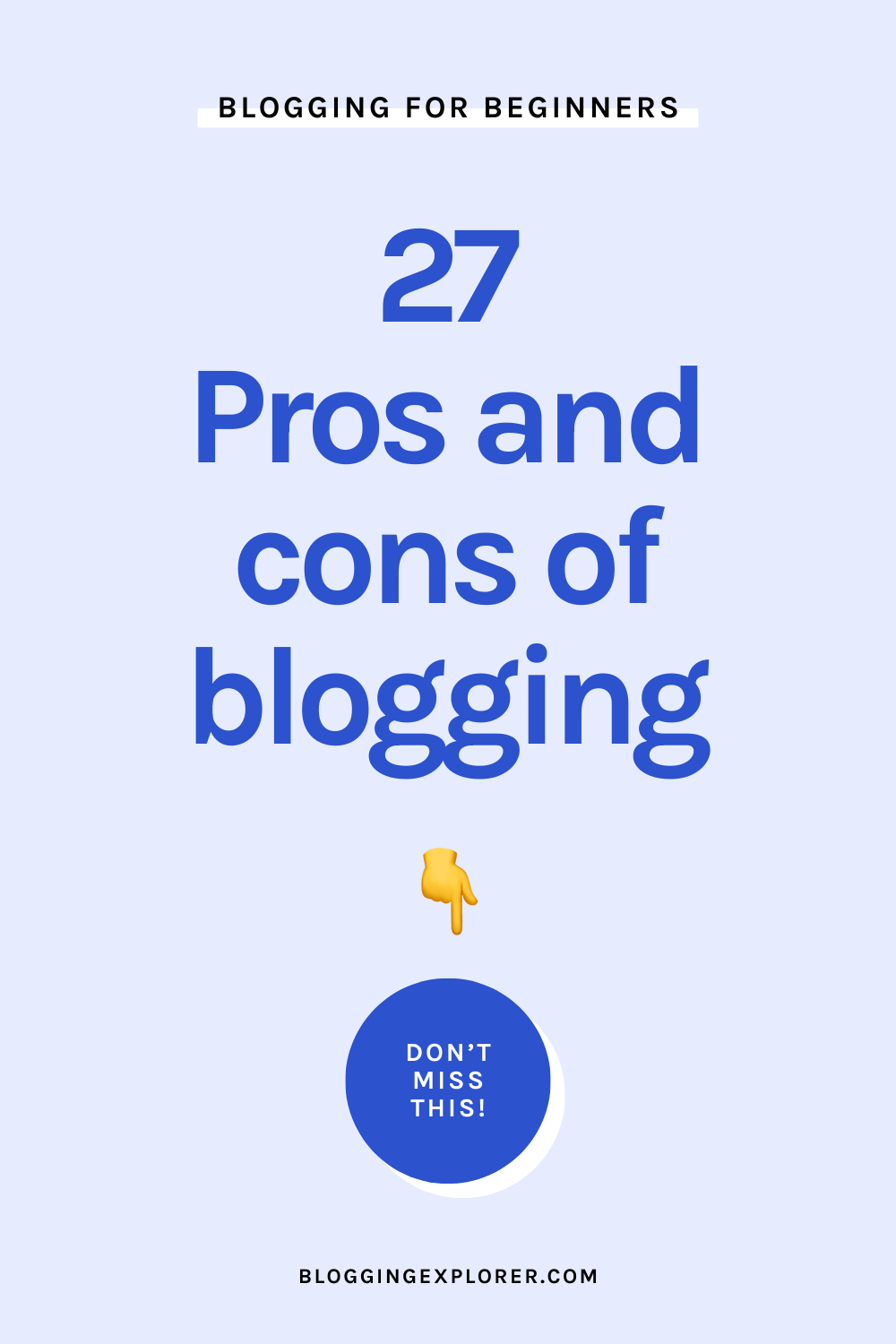So you’re wondering whether you should start a blog or not? You’re not quite sure about the most important pros and cons of blogging you should know about to make up your mind?
Then you’re in the right place!
I know it may feel difficult to take that first step and get your first blog up and running. After all, blogging can take up a lot of your time, depending on how fast you want to gain traction, grow your traffic, and monetize your blog.
With that said, even if you’re running a busy schedule with work stuff, picking up your kids from hobbies, taking care of your family, or just having a little breather, blogging is definitely something you can squeeze in there.
Here’s why: You won’t be accountable to anyone.
That’s right! Blogging gives you absolute freedom when it comes to how much time and effort you invest into it.
Of course, the more time you’re able to dedicate to growing your blog, the faster you’ll achieve your goals. But going slow is a good idea, too. It allows you to learn one thing at a time and get familiar with blogging in general. One by one, you’ll work your way through milestones towards your long-term goal.
So what are some of the most important pros and cons of blogging, then?
I’ve been blogging since 2016 and I’ve gone through all the ups and downs you can possibly imagine through out the years. But all in all, it’s been one of the most empowering and liberating experiences in my life — I wouldn’t be where I am right now without it.
In this post, I’ll walk you through 27 pros and cons of blogging you should know about. I’ve seen them all and want to share my experience with you. Who knows, perhaps you’re going through similar feelings and this post can help you find some clarity.
So if you’re on the fence about starting a blog, these pros and cons of blogging will help you make up your mind and figure out whether you should start a blog right now or perhaps a bit later.
Let’s get started!
- Pros of blogging (Advantages of starting a blog)
- 1: Making money online
- 2: Achieving more freedom in life
- 3: Growing your reach and increasing your visibility
- 4: Being flexible with your blogging work
- 5: Helping others with what you know
- 6: Working with something you love
- 7: Having fun and being creative
- 8: Learning new skills
- 9: Networking with others
- 10: Working from anywhere
- 11: Promoting and selling your own products
- 12: Being your own boss
- 13: Finding new career opportunities
- 14: Challenging yourself
- 15: Starting a blog is cheap
- Cons of blogging (Disadvantages of being a blogger)
- 1: Committing to a regular blogging schedule
- 2: Following a strategy
- 3: Staying consistent
- 4: Needing decent writing skills
- 5: Worrying about privacy issues
- 6: Feeling overwhelmed from time to time
- 7: Needing organization skills
- 8: Having to invest (a little)
- 9: Needing patience (to see results)
- 10: Requiring some tech knowledge
- 11: Wearing a dozen hats
- 12: Needing time to gain momentum
- FAQ: Pros and cons of blogging
- Final thoughts: Advantages and disadvantages of blogging
Please note: This post contains affiliate links to products I use, trust, and recommend. If you choose to purchase a helpful product using these links, I may receive a small commission for referring you – at no extra cost to you. These funds help me keep this blog up and running.
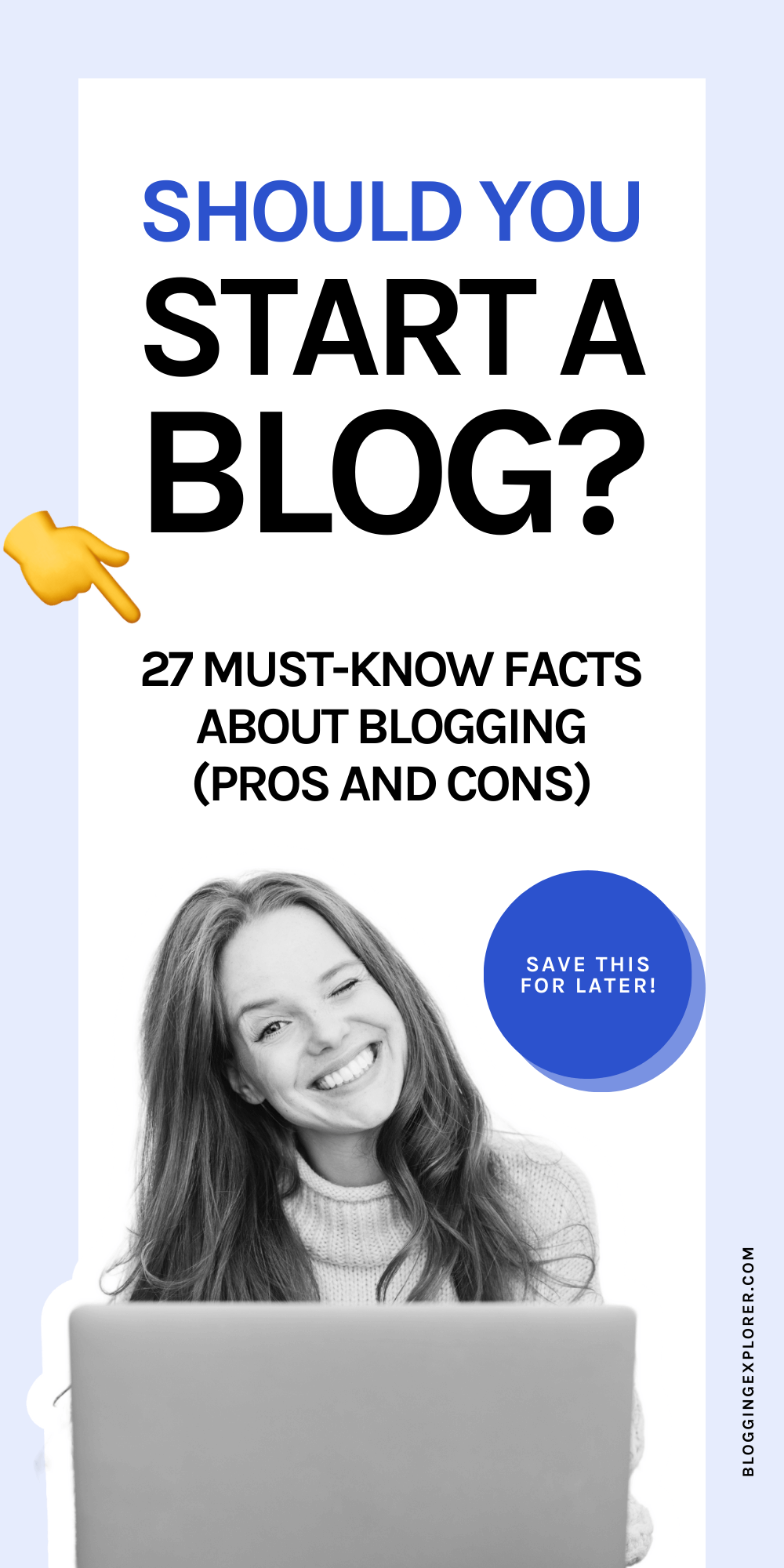
Pros of blogging (Advantages of starting a blog)
Let’s start with the good stuff, shall we?
Here are the biggest pros of blogging:
1: Making money online
Alright, let’s cut to the chase. Blogging isn’t just about sharing your thoughts; it’s about turning those musings into online income.
Sure, it takes time, but once that cash train starts chugging along, it’s full steam ahead.
The best part?
Making money blogging isn’t complicated. It all boils down to this:
You have to deliver value to your readers.
They have questions and problems they need help with. As long as you deliver answers and solutions, you’ll grow your reach and can monetize your blog sooner than you may think.
Here’s how I like to monetize my blogs:
- Affiliate marketing means that you’ll recommend products to your readers. When someone clicks your trackable affiliate link and makes a purchase, you will earn a commission.
- Display ad networks allow you to place ads on your blog. When visitors see and click them, you will earn money.
- Selling your own products allows you to grow your blogging income much faster than anything else. Since you get 100% of the revenue, creating your own product should be on your to-do list from the get-go.
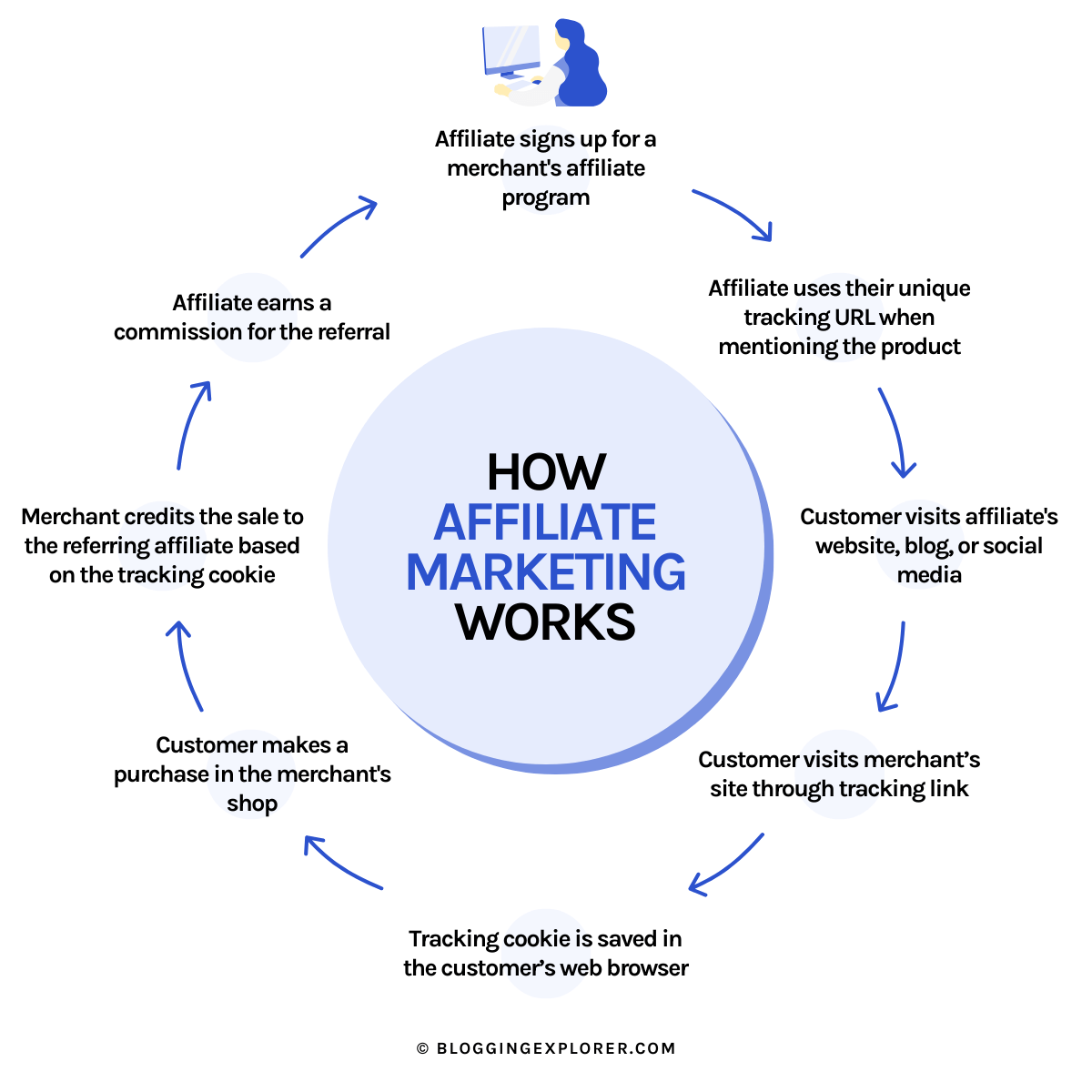
That said, remember that blogging isn’t a get-rich-quick scheme. It takes a lot of hard work and commitment, and you won’t see results overnight.
Nevertheless, what awaits at the end of the rainbow is totally worth it!
2: Achieving more freedom in life
Tired of the 9-to-5 grind? Maybe your job doesn’t feel fulfilling?
Blogging might just be your golden ticket out of that snooze fest.
Now, I’m not saying quit your day job tomorrow. Right now, if you’re thinking about starting a blog, it’s about finding a blog topic that feels less like work and more like a party.
As your blog gains traction and the dollars start rolling in, guess what? You’re the captain of your ship. Blogging gives you the freedom to plot your course. It’s all about commitment and a solid blogging routine.
Your readers want to hear from you, so give ’em what they want!
3: Growing your reach and increasing your visibility
Now, let’s talk about taking your blog from a cozy corner to the bustling main street of the internet.
It’s not just about having a blog; it’s about being seen and heard by the masses.
Imagine this: You write a killer post, hit publish, and suddenly, your words are echoing far and wide. That’s the beauty of growing your reach.
Blogging isn’t a diary tucked under your mattress; it’s a loudspeaker for your thoughts.
As you churn out valuable content, you’re not just talking to your next-door neighbor. You’re reaching folks across continents, cultures, and coffee shops. It’s like having a global chat over a cup of virtual coffee.
But it’s not just about numbers — it’s about impact. The more eyes on your content, the more lives you touch.
Your blog becomes a beacon for those seeking insights, laughs, or a virtual shoulder to lean on.
Increasing your visibility isn’t a one-shot deal. It’s a gradual climb. Think of it like a marathon, not a sprint. With each post, you’re laying down breadcrumbs that lead new readers to your doorstep.
Whether it’s through social media, collaborations, or good old SEO magic, growing your reach isn’t just a blogging perk; it’s a superpower.
4: Being flexible with your blogging work
Let me be honest: I’m not a morning person. Never been, never will be.
So one of the biggest problems I used to have with my office job was to drag myself to work every morning. I would crawl out of bed with my eyes still shut, hoping a bucket of coffee would wake me up.
After copious amounts of strong coffee I would feel like a living human being again.
Sounds familiar?
If you’re not a fan of the 9-to-5 straitjacket, you are going to love blogging.
Ever felt inspired at 11 PM? Well, with blogging, you’re not confined to office hours. Your creativity doesn’t punch a clock. You’re the boss of your schedule, and that’s a game-changer.
Picture this: You’re sipping coffee in your PJs, typing away on your newest blog post while the rest of the world is stuck in morning traffic. That’s the beauty of being flexible with your blogging work.
Life throws curveballs, but blogging catches them. Sick day? No problem, you can still draft a post from your cozy blanket fort. Family emergency? Your blog doesn’t shut down. It waits patiently for your return.
5: Helping others with what you know
When I started my first blog, I remember thinking “Why should anyone read what I have to say?”
I had simply started to learn how to code by myself, and wanted to share my experience. Seriously, that was it. I didn’t have a big master plan to conquer the world or make a fortune.
But oh boy, I was so wrong.
Before I knew it, I started receiving the most amazing emails from my readers. They were interested in teaching themselves programming skills, too, and found helpful tips and resources on my blog:
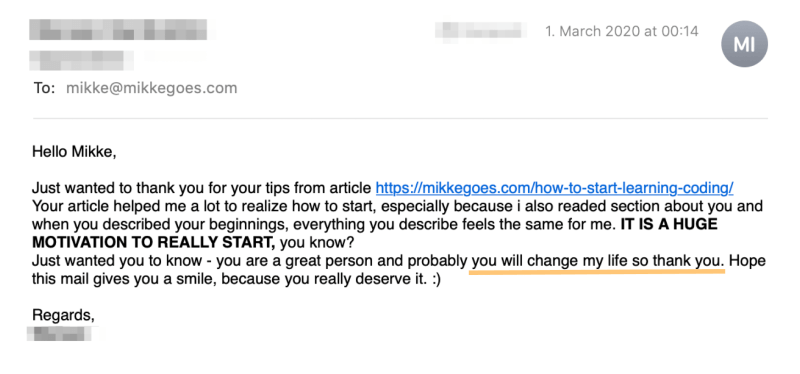

Trust me, reading those emails was one of the most rewarding and empowering moments of my life.
Blogging isn’t just about shouting your thoughts into the void — it’s about making a difference in your readers’ lives.
Your experiences, lessons learned, and triumphs become a roadmap for others navigating similar paths.
Whether it’s overcoming a challenge, mastering a new skill, or finding a fresh perspective, your blog has the power to be someone’s guiding star.
6: Working with something you love
Blogging is your ticket to turning your passion into a daily gig. It’s not just work; it’s a love affair with your blog topic and niche.
Imagine waking up excited to dive into your blog. Whether it’s fashion, gaming, gardening, or the intricate art of making the perfect pancake — your blog lets you geek out on what you love.
When your blog revolves around your passion, ‘work’ doesn’t feel like a chore. It’s a joyous exploration, a chance to deep-dive into the topics that set your soul on fire.
And here’s the magic: when you’re genuinely interested in your topic, it shows in your writing. Your enthusiasm becomes contagious, drawing in readers who share your love for the same niche.
7: Having fun and being creative
Although making money blogging is an important goal for most bloggers, having fun and spending time with a topic you enjoy is just as important.
Being creative and enjoying your blogging journey also has a lot to do with the niche you choose.
For instance, if you blog about baking, trying out new recipes is definitely going to be a ton of fun!
Or if your blog is about travel tips in your area, you can get as creative as you want with your suggestions and recommendations for your readers.
For me, blogging has always felt more like a fun hobby than a job. And that’s a good thing! The more you enjoy working with the topic you choose, the more motivated you’ll feel to keep going for years to come.
8: Learning new skills
One thing that continues to amaze me about blogging is how much you can learn along the way.
Regardless of your blog niche, you’ll spend a lot of time on:
- Brainstorming new content ideas
- Researching potential blog post topics
- Answering common questions about each blog post topic
- Connecting with your readers
Needless to say, you’ll learn a ton about your blog topic just by keeping that content creation machine running!
So while you’re creating valuable content for your readers, you’ll also get a chance to learn about things you find interesting and intriguing. Before you know it, you’ll feel like an expert in your field. And hey, who knows, maybe you’ll even launch your very own online course to share your konwledge and help out other bloggers in your niche with your experience and expertise.
Moreover, there are quite a few blogging tasks that allow you to learn new skills in:
- Email marketing
- Website and blog management and maintenance
- Internet marketing
- Social media marketing
- Search engine optimization
- and more!
Remember: these skills are in high demand in the job market, too. If you’re a part-time blogger, chances are you can apply these skills to your full-time job, too.
9: Networking with others
Oh yes, networking with like-minded people from around the world is one of the best pros of blogging.
If you’ve ever felt lonely with a hobby or an interest and never found anyone to share your thoughts with, blogging is a fantastic opportunity to network with others who are probably struggling with the same issue.
I’m a massive video game nerd and I never found friends who were as enthusiastic about playing strategy games, so I could never exchange new ideas and thoughts with someone who understood what I was saying. But through blogs and YouTube channels, I’ve found a ton of like-minded nerds around the world.
No matter what your hobby is, there’s an online community out there packed with people who are into the same hobby as you are.
10: Working from anywhere
Blogging is one of the most flexible and empowering ways of making money online and achieving financial freedom while working from anywhere you want.
All you need is a laptop and an internet connection — and you’re good to go!
I remember writing one of my first ever blog posts back in 2016 when I was entirely new to blogging. What made all the difference was that I was on a vacation on the beautiful island of Curaçao, looking out to the ocean and thinking:
“Uhm, things could be worse.”
So whether you simply want to work from home by yourself for some peace and quiet or travel the world and become a digital nomad, blogging is one of the best ways to pay your bills.
11: Promoting and selling your own products
Do you have an idea for a product that you’re just dying to put out there so that people can buy it? Congrats!
Starting a blog means you’ll have a platform to reach your target audience, educate them about the benefits of your product, and sell it to them directly.
Whether you want to sell digital products, online courses, jewelry, kitchen utensils, ceramics, plant seeds, or services, blogging is a fantastic way to grow your reach and connect with potential buyers.
Plus, since you’ll be running a website for your blog, it’s easy to turn that website into an online shop. If you use WordPress for your blog like I do, the free WooCommerce plugin is your #1 choice for selling products through your website.
However, if you’re planning to sell digital products, such as e-books, I recommend using a platform like SendOwl.
If you want to offer online courses, use a course platform such as Udemy or Teachable.
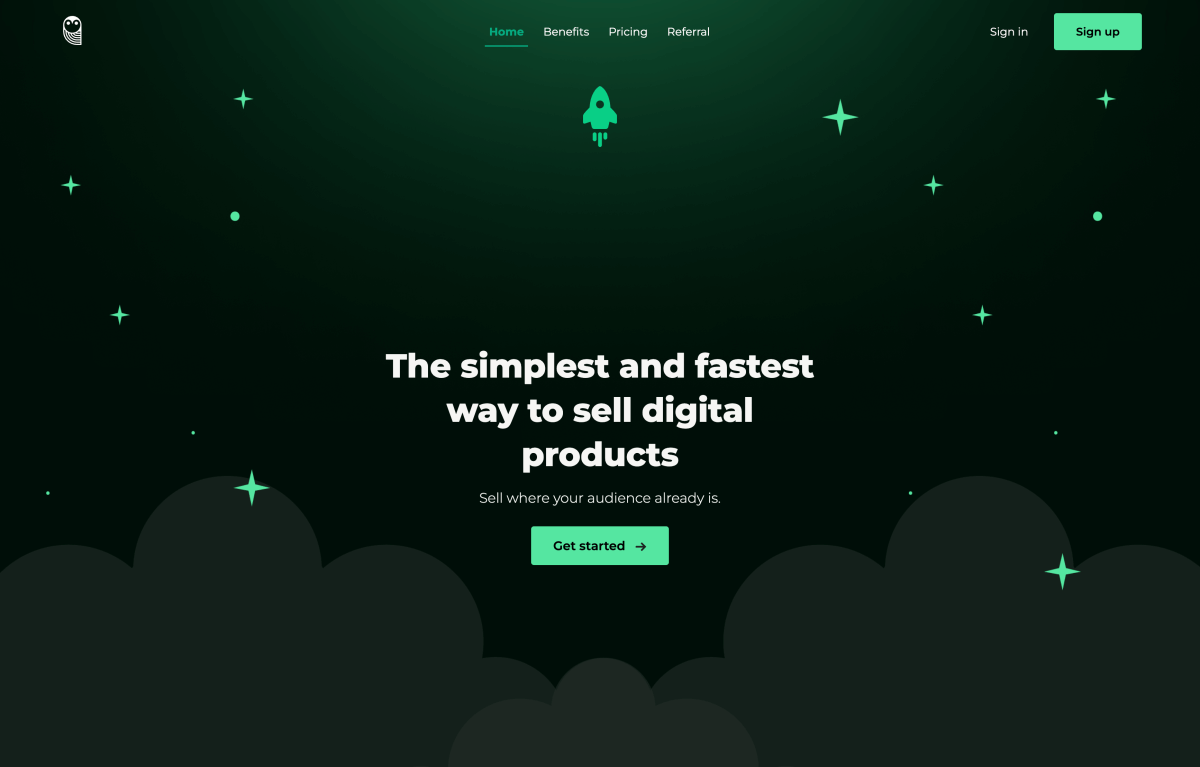
12: Being your own boss
If the whole 9-to-5 rat race isn’t really your thing, blogging is a fantastic way to break free and become your own boss.
Sure, it’ll take some time to gain enough traction to become a full-time blogger. But if that’s what you want, there’s nothing stopping you.
And having a clear goal like that helps you maintain your motivation and focus. Since you know why you’re investing time and effort into blogging, it’ll be much easier to avoid feeling overwhelmed and stay driven.
When I started my first blog, I wasn’t planning to turn it into a side hustle. Only about 12 months into it, I realized I was leaving money on the table. I was recommending courses and products that I was using myself, and I decided to join an affiliate program for one of them.
And just like that, I earned my first bucks from affiliate marketing. My readers found my course recommendations helpful, the course platform received new customers, and I earned a commission every time someone decided to purchase a course through my links. It was a win-win-win!
Since then, I’ve grown my blogging income step-by-step. And even though it fluctuates quite a bit, it’s earned me more in some months than my actual job does.
That said, if you’re feeling frustrated and your current job doesn’t feel fulfilling, starting a blog may just be the best thing you can do right now.
13: Finding new career opportunities
If full-time blogging isn’t your goal, no worries. Being a part-time blogger can be just as rewarding and empowering.
When managing your blog and publishing new content regularly, you’ll learn a ton of valuable, in-demand skills that will come in handy in the job market.
Whether you’re improving your skills in content marketing, SEO, social media marketing, or communication, those skills can help you discover new career opportunities in the long run.
The best part?
Learning new skills while doing hands-on work through your blog makes it easy to demonstrate your skills to a potential employer. After all, you’ll have your blog to showcase the results you’ve achieved through your hard work.
14: Challenging yourself
If you’re on the lookout for new challenges and becoming the best version of yourself, blogging is a fantastic way to challenge yourself.
Since you’ll be learning a bunch of new skills through blogging, you’ll have a ton of chances to tackle new challenges as often as you wish.
And with every challenge you overcome, you’ll feel more confident and empowered to keep going.
I can’t tell you how many personal challenges I’ve had to overcome along my blogging journey! Whether it’s been about writing the best content I can or creating the perfect digital products based on my readers’ feedback, I’ve pushed myself to the limit more often than I can remember.
If you’re ready for a challenge, now is the perfect time to get your blog up and running!
15: Starting a blog is cheap
Last but certainly not least, one of the biggest pros of blogging is:
It’s very affordable to start a blog.
Compared to launching any other type of online business, blogging is downright cheap.
When you think about starting an online business and maybe selling physical products, you’ll need to invest money into your initial stock, customer service, administration tools, marketing, etc.
That’s going to quite an investment — and you’ll sometimes have to wait for months to get things up and running.
Blogging is different.
What if I told you that you can start a blog for less than $30?
To be exact, you can get a professional blog set up for $23.88 for the first 12 months with Bluehost.
This is the exact identical setup I used for Blogging Explorer when I launched this blog. And I couldn’t be happier with it.
To claim your discount, head over to Bluehost.com and click on Get Started Now:
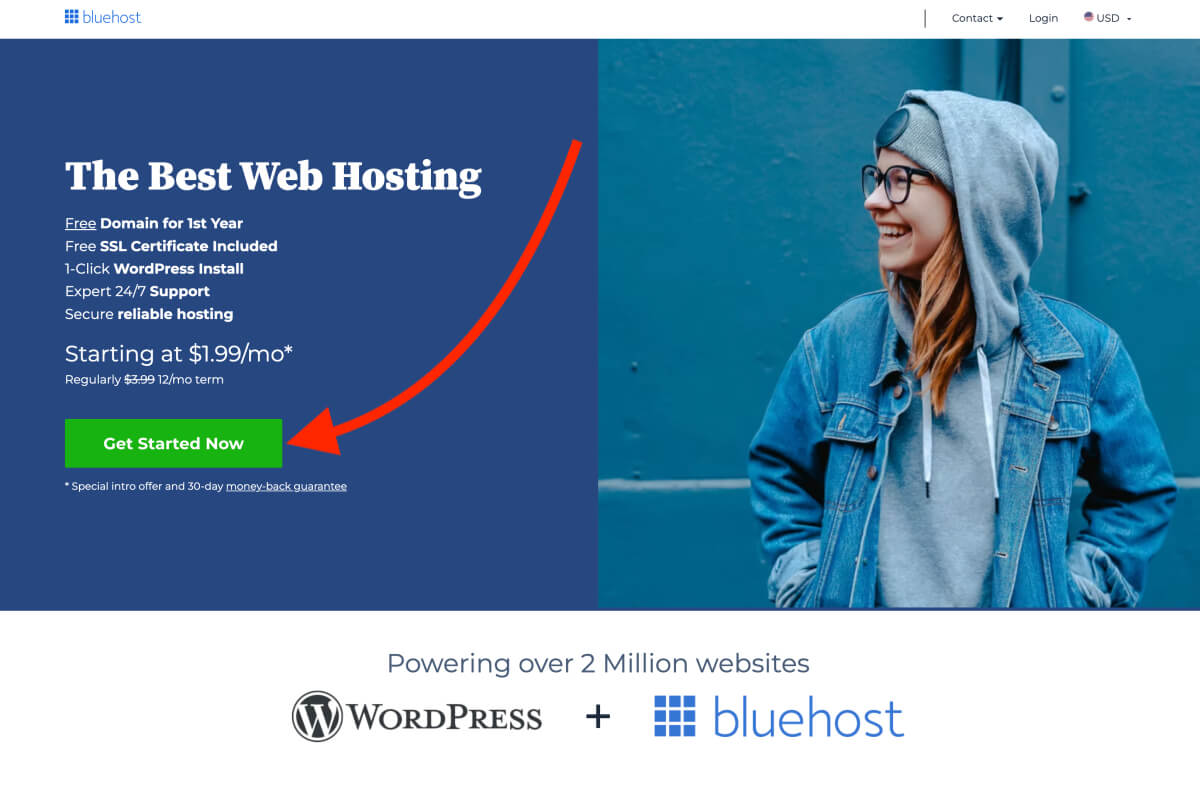
Next, choose the Basic plan for your blog hosting — it’s the perfect package for your new blog:
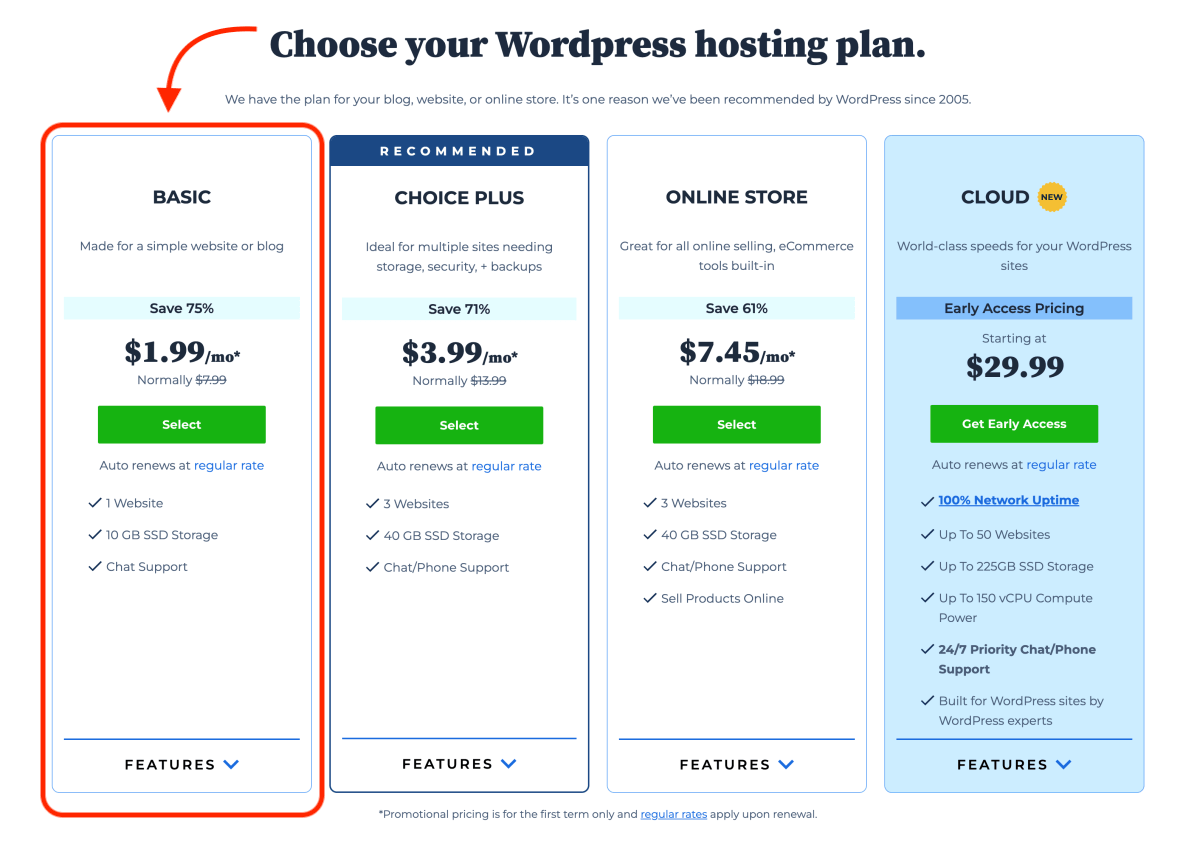
So what does this package include exactly? What tools do you need to get your blog up and running?
To start a blog, you will need:
- A domain name — This is the name of your blog website. My domain name is bloggingexplorer.com, for example.
- A web hosting plan — This is where your blog website will “live”. You will sign up with a hosting provider (such as Bluehost) to rent space on their web server. In return, your hosting provider will store or host your website files on that server. This way, your website is accessible to anyone who types your domain name into their web browser.
- Blogging software — To manage your blog content, you need a blogging platform (I recommend WordPress) installed on your hosting plan. Don’t worry, you won’t have to take care of the technical side of it yourself. Your web hosting provider will take care of that when you sign up for a hosting plan. After that, you will receive an email with your login credentials and a detailed overview of how you can log into your blog website to start writing your first blog post right away.
Of course, you’re free to use any provider you choose to host your blog. I’m sticking to Bluehost simply because I’ve had the best overall experience with them so far. Plus, it’s super easy to have your domain and web hosting under one roof.
The best part is: Bluehost gives you a fair 30-day money-back guarantee. (But I know you’ll love starting your blogging journey with them like I did.)
For a full step-by-step tutorial, head over to my guide on how to start a blog in 30 minutes (with no experience).
Cons of blogging (Disadvantages of being a blogger)
Now that you’re familiar with some of the biggest advantages of blogging, let’s look at a few of the most important challenges.
But remember: I’m not trying to kill your motivation here. I simply want to be 100% transparent and honest with everything I’ve struggled with throughout the years along my blogging journey.
Because the thing is: blogging is an amazing, rewarding experience, but it’s also very demanding at times. You need patience and dedication to achieve your goals.
But hey, if I can make it, so can you.
Ready? Let’s dive in!
1: Committing to a regular blogging schedule
If you’re serious about growing your blog and monetizing your content, you need to commit to publishing new blog posts on a regular basis.
Being consistent with your schedule is the best way to gain visibility, rank higher on Google, and start earning money from your blog.
Now, this doesn’t mean that you need to publish a new blog post every day.
It’s perfectly OK to publish new content once a week or even once a month.
Just make sure you commit to a regular, realistic schedule you can stick to.
2: Following a strategy
Having a consistent blogging schedule is a great start. But to see the best results possible you also need to follow a clear blogging strategy.
A clear strategy helps you stay focussed on a single goal. Without a strategy, you’re more likely to get distracted by new ideas that don’t necessarily help you grow your blogging business.
The good news is: setting up a strategy isn’t difficult. In fact, it’s super easy!
Take some time right now to brainstorm a few key points for your blogging strategy. Ask yourself:
- Why am I interested in starting a blog?
- How do I want my life to change through blogging?
- Who do I want to help with my blog content?
- Where do I want to be as a blogger in 12 months? How about in 3 years?
Jot down your ideas and come back to them tomorrow. Add more details and ideas to your answers and make them as clear, concise, and measurable as possible.
Check out my post with 4 powerful blogging strategy techniques for even more helpful tips.
3: Staying consistent
If you want to become a successful blogger and build a profitable blogging business, consistency is key.
And I know I’m starting to sound like a broken record, but bear with me.
Consistency doesn’t just mean publishing new blog posts on a regular basis. It also means that you need to stay consistent in other areas, too.
Throughout your blogging journey, you will conquer new tasks and areas one by one as your blog starts gaining traction.
You will start by learning the basics of your blogging system (I recommend the self-hosted WordPress.org platform).
Within WordPress, you will learn how to:
- Write and edit blog posts
- Customize your blog design
- Add helpful features to your blog with WordPress plugins
- and more
So to keep moving forward, you will need to stick to a consistent learning plan.
Take it slow and practice one thing at a time if you can. Otherwise, you could start feeling overwhelmed. (We don’t want that.)
And hey, it’s perfectly normal to lack motivation from time to time. We’re all just human beings, so don’t be too hard on yourself.
Just have fun with it, make a list of the things you need to learn and practice, and go at your own pace. (I know you can do this!)
4: Needing decent writing skills
Obviously, writing blog posts is a huge part of blogging – duh.
So you will need decent writing skills to get your message across to your readers.
This doesn’t mean you need to be a master copywriter, though. As long as your blog posts have a logical structure and your text is easy to read, you’re doing a great job.
And you know what?
Your writing skills will improve over time. The more content you put out there, the better your writing will get.
Here are a few helpful tips to improve your writing and content quality:
- Read other blogs to find inspiration. Pay attention to how they structure their blog posts.
- Read the news to stay on top of what’s happening in the world. Pay attention to article titles and content structure.
- Start with a blog post outline before you start writing your article. Map out your intro, body and talking points, and conclusion. (I use Copy AI for this.)
- Use simple words and language to make your articles easier to read and skim through.
- Check your spelling and grammar with a free tool like Grammarly. Typo-free articles increase readability and your credibility as a blogger, too.
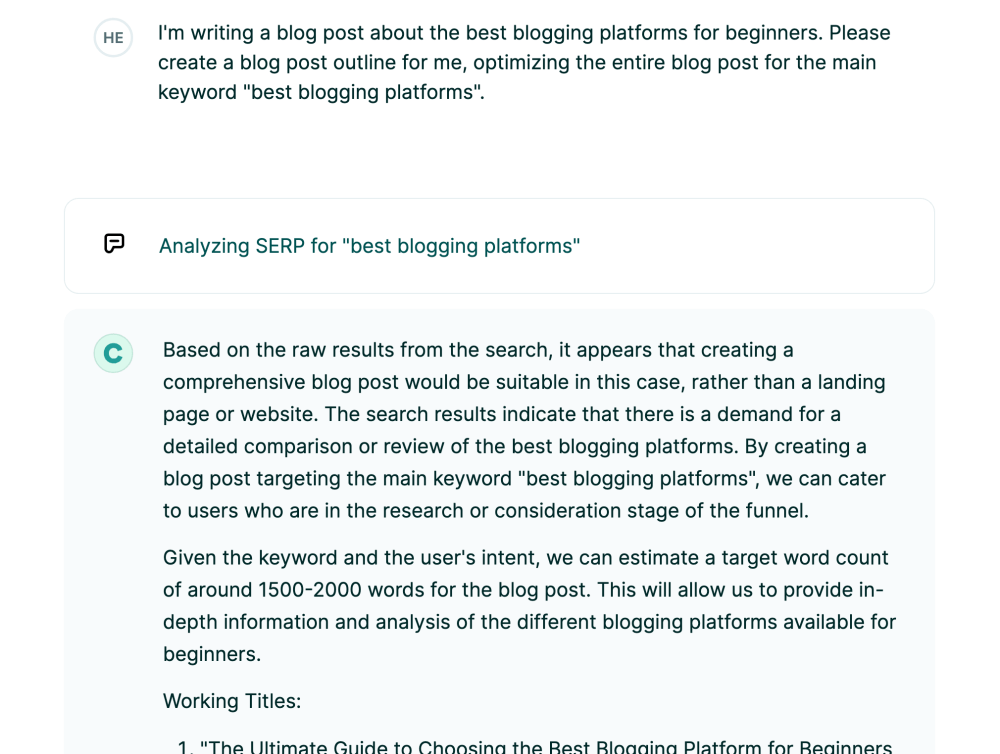
5: Worrying about privacy issues
Blogging is often a very personal journey. And most bloggers out there use their own names and share their experiences, including yours truly.
But what if you’re not comfortable sharing your name or life on your blog?
Can you still build a profitable blogging business?
Yes you can.
Although sharing your personal story makes your content more relatable, there are tons of successful blogs out there that publish content without mentioning any names or personal experiences.
Most often, you will find these types of articles on non-personal blogs:
- Product reviews
- Product comparisons
- “Best products” listicles
- Step-by-step tutorials
So yes, sharing your name and personal story isn’t 100% necessary to make it as a blogger.
But to be honest, it depends on your target audience. They’re reading your articles because they’re looking for answers and solutions for issues they’re struggling with. Needless to say, if they can relate to you on a personal level because you’re sharing your own experiences on similar issues, they’re much more likely to become loyal readers.
At the end of the day, do what you feel comfortable with. Every blogger has a unique journey and you don’t have to be like everyone else out there if that’s not your thing. You’re awesome no matter how much personal stuff you share on your blog!
6: Feeling overwhelmed from time to time
When you’re new to blogging, it can be a lot to take in.
You’ll need to:
- Get your blog up and running (here’s my step-by-step tutorial to get it done like a pro)
- Find blog post ideas to write about
- Figure out how to customize your blog design
- Learn your way around WordPress
- Start your email list to turn readers into email subscribers
- and more
So you’re wearing a ton of hats right from the get-go, and things can feel overwhelming pretty quickly.
If that sounds familiar, just take a deep breath.
There’s no hurry. You can take your time, learn one thing at a time, and go at your own pace.
Trust me, I’ve been there. And to be honest, I still feel overwhelmed with blogging sometimes. With so many moving pieces to the puzzle, it’s perfectly normal to feel stuck and over-analyze things from time to time.
Whenever that happens, I just take a step back from everything. Whether it’s a long walk or a day off (or two), giving your brain some time to sort out everything is the best way to beat blogging overwhelm.
In fact, I often get the best ideas while taking those long walks! My secret trick: I talk to myself while walking around town. That helps me structure my thoughts and get some clarity on what I’m working on. I know I probably look like a crazy person to people passing by, but I just don’t care.
So my advice is: make a list of all the things you want and need to learn and practice. Map them out in a chronological order. Then work your way through them one by one. Once you feel comfortable with one thing, check it off your list and move on. And remember to celebrate every milestone you achieve!
7: Needing organization skills
Organization is key when it comes to blogging and following a consistent publishing strategy.
Trust me, organized to-dos equal organized thoughts. If your ideas are all over the place, that’s how your blog will feel to your readers, too.
So how do you organize your blogging tasks, then?
I’m a big fan of simple organization tools where you can:
- Create list of to-dos
- Categorize and group them together
- Check off tasks you’ve finished
You want to find a tool for organizing your to-dos that feels easy and intuitive for you.
Here are a few organizing tools you can try out:
- The good old pen and paper (works like a dream!)
- Trello is a super easy tool for organizing, grouping, and tracking your to-dos. (It’s free to use.)
- Asana is a more advanced tool for tracking your tasks. (This is the tool I use nowadays.)
- Google Sheets is perfect for you if you like working with tables and spreadsheets.
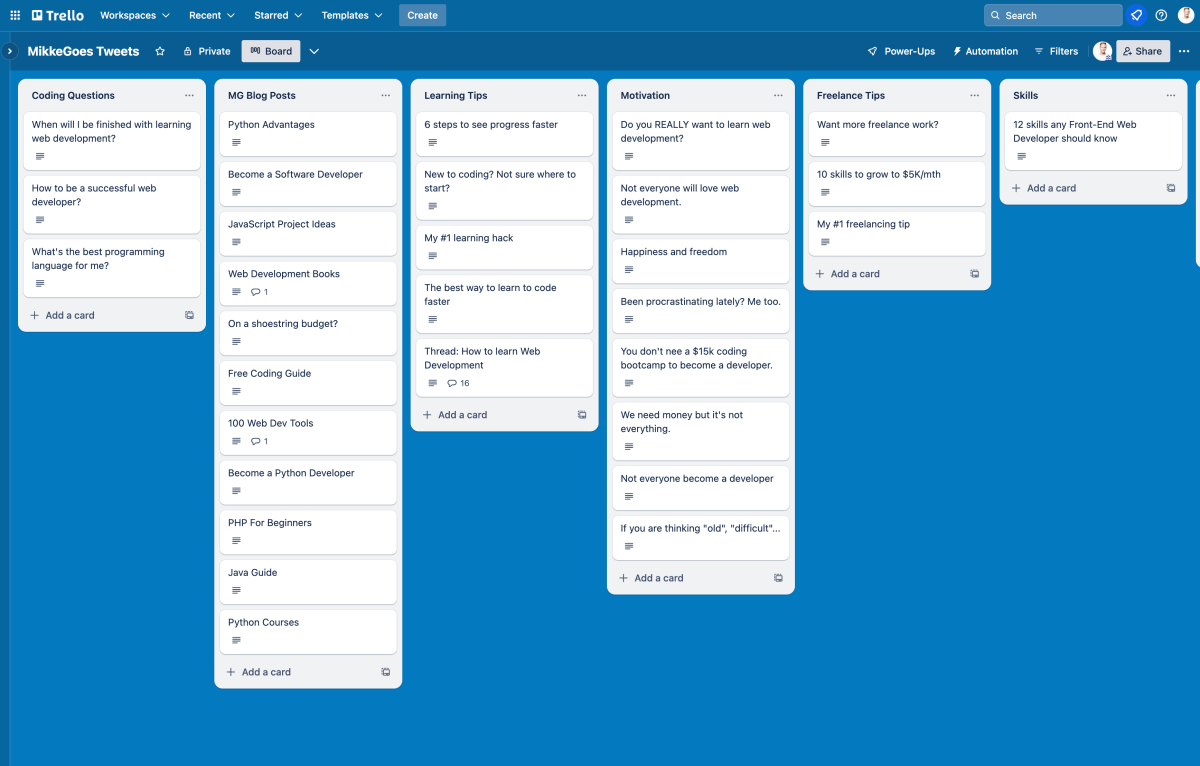
8: Having to invest (a little)
Just like starting any online business, starting a blog requires a small initial investment.
Right now, you don’t need to break the bank and buy the fanciest tools out there. To get started, I recommend investing the bare minimum to get your blog site set up.
Why? Because right now you should focus on learning how blogging works and figure out your own workflow that you feel comfortable with.
Once you start earning some money with your blog, you can consider adding tools to your workflow that save you time. That way, you can work more efficiently and grow your blog traffic and income even further.
But can’t you start a blog for free?
Sure, some bloggers start with a free blogging platform, but I recommend setting up a professional, self-hosted blog from the get-go.
Why?
Because free blogging platforms always come with limitations. If you want to eliminate them, you end up paying more than you would have if you had set up a self-hosted blog from the beginning.
Self-hosted simply means that you will sign up with a blog hosting provider and choose a custom domain name for your blog.
For example, to start this site, I signed up for a blog hosting plan with Bluehost and chose bloggingexplorer.com as my domain name.
This way, I have full control over what I do with this site and how I monetize it.
Also, I own the rights to my content (which isn’t always the case with free blogging platforms).
And I don’t have to worry about my blog being shut down for no reason and losing all my content I worked so hard to create (which is something that can happen with free platforms, sadly).
Summing it up: blogging is like any other online business. You need to invest a little to get everything set up. But when you think about the income potential from blogging, that initial investment is going to pay itself back soon.
I’ve written a full article on how much it really costs to start a blog – definitely check it out!
9: Needing patience (to see results)
When you start a blog, you can’t expect to see substantial income right away.
I repeat: blogging is not a get-rich-quick scheme.
While it’s perfectly realistic to achieve a full-time income through blogging, it’s not going to happen overnight.
In fact, it will most likely take a few months until you start earning your first bucks from your blog.
But when that happens, you’ll start gaining momentum and your blog traffic and income will grow gradually.
This is definitely one the biggest cons of blogging. But it’s just how things work in the blogging universe, and blogging isn’t for everyone.
Having said that, remember that your patience and determination will be rewarded.
Over time, your hard work will pay off. It did for me, with all my blogs!
It all boils down to staying focussed, following a clear strategy, and being mindful of why you’re doing this in the first place.
What can you do to speed things up and make money faster?
Here are a few tips to monetize your blog faster:
- Publish more content — The more blog posts you publish, the faster your organic traffic will grow.
- Make your articles top-notch — Focus on quality over quantity!
- Deliver as much value as you can — Find out what your target audience struggles with. Then, publish comprehensive, detailed articles that solve their problems and answer their questions. Share everything you know about the topic!
- Start affiliate marketing — Pick a product or service you’ve used that’s made your life easier. Make sure it’s relevant to your target audience and become an affiliate. Create a helpful and valuable blog post about how that product has helped you and how you use it. Include your special affiliate link to that product to earn a commission every time someone makes a purchase through your link.
- Learn search engine optimization — SEO should be the cornerstone of your blogging strategy. Organic search engine traffic is free, it ramps up, and it converts better since those people are already actively searching for answers and solutions.
- Leverage Pinterest to grow your blog traffic — I’ve perfected my Pinterest marketing strategy since 2019 and turned it into an evergreen, free traffic source. The best part? You can generate organic traffic through Pinterest almost instantly while you’re waiting for your content to rank on Google.
10: Requiring some tech knowledge
Starting a blog requires some technical knowledge, but anyone can do it.
If blogging feels intimidating because you don’t feel comfortable with managing a website, don’t worry. These days, the WordPress blogging software is super easy to use — even for complete beginners.
And the best part is: the more you use it, the more comfortable you will feel. In fact, blogging can be extremely empowering and rewarding. You will soon realize that you are able to do so much more than you expected!
So what about setting everything up? Isn’t it super technical to set up a blog website?
No, it doesn’t have to be.
To make the initial setup as easy and hassle-free as possible, you want to pick a blog hosting provider who does all the heavy lifting for you.
Ideally, all you need to do is sign up for a blog hosting plan and have them set up the technical stuff in the background for you.
Again, I recommend Bluehost for this. With them, you simply pick your hosting plan and fill in all your details. During your sing-up, your entire blog website is set up for you in the background.
So when you finish signing up, you can instantly log in to your blog site and start writing your first blog post. Neat!
Follow a step-by-step tutorial for setting up a WordPress blog with Bluehost with detailed screenshots to walk you through everything at your own pace.
11: Wearing a dozen hats
Yes, a blogger does indeed wear a dozen different hats.
In just one week, you might:
- Research keywords for your upcoming articles
- Write and publish a new blog post
- Send out an email newsletter to your subscribers
- Design social media images to publish on Instagram, Facebook, or Pinterest
- Respond to emails and messages from your readers
- Negotiate rates for sponsored blog posts
- and more
That’s a lot to do for one person!
But the good news is: no one’s expecting you to do all of this right away when you’re just getting started.
In fact, you’ll start with the very basics in the beginning. In your first weeks and months, you should focus on getting comfortable with WordPress and how to write and publish blog posts.
As I said earlier, you don’t want to overwhelm yourself and try to learn everything at the same time.
Instead, make sure you take your time, take enough breaks, and go slow.
And when you feel stuck, ask for help. You’re not alone!
If you’re struggling with something right now, drop me a line in the comments below! I’m happy to help.
12: Needing time to gain momentum
Obviously, most bloggers embark on this journey because they want to turn blogging into a side hustle or even their full-time job.
And that’s perfectly OK! Blogging is a fantastic way to earn a few extra bucks or even become your own boss and quit your day job in the future.
But the truth is:
It takes time to achieve those goals with blogging.
While you can’t expect to see instant results, know that everything you’re doing will pay off in the long run.
Even if you’re not seeing much traffic or income in the first few months, don’t be discouraged. We’ve all been there!
If you feel like all your hard work isn’t paying off, take a step back. Remind yourself about why you’re blogging in the first place. How do you want your life to change through blogging?
Maybe you want more financial freedom in life? Or you want to work on your own terms because your current job doesn’t feel fulfilling?
Or perhaps you’re looking to become a digital nomad and work from anywhere in the world? Or increase your earnings to support your family?
Whatever you wish to achieve, make sure you remind yourself what it is exactly.
Because the thing is: the sky is the limit when it comes to blogging. The more determined and focused you are, the faster you will see results.
It simply takes time to gain enough momentum to see the results you expect. But again, you’re not alone. All bloggers go through the same phases and it simply requires a ton of patience and perseverance.
Trust me, you will achieve your goals in the long run. You will see that traffic eventually and you will be able to monetize your content.
And once that ball starts rolling, there’s no stopping it!
FAQ: Pros and cons of blogging
Becoming a part-time or full-time blogger offers a few key benefits like making money blogging, connecting with like-minded people worldwide, spending time with a topic you enjoy, getting to help others by sharing what you know, learning in-demand professional skills, and finding new career opportunities. Even if you have no prior experience, you can gradually establish yourself as an expert in your field, improve your writing skills, and gain valuable SEO and marketing experience.
While blogging is mostly rewarding and empowering, it can be time-consuming, too. Building a successful blog takes dedication, determination and consistency. You can’t expect to see results overnight. There’s also no guarantee of income, and the blogging landscape can be competitive. Blogging requires self-discipline to maintain your focus and a healthy work-life balance. Hence, blogging isn’t a get-rich-quick scheme, and it takes hard work to achieve the results you expect. Nevertheless, once you gain traction, the results usually ramp up.
Yes, blogging can be a lucrative way to generate income. However, it requires patience and strategy. There are various monetization options, such as promoting affiliate products, placing display ads on your blog, and selling your own products or services.
Unfortunately, there’s no one-size-fits-all answer. Building a profitable blog can take anywhere from six months to a year or even longer. It depends on various factors like your niche, content quality, and marketing efforts. Following a consistent blogging schedule and strategy is the best way to make sure you’re not wasting your time on techniques that don’t work.
While strong writing skills are a plus, they’re not an absolute necessity to start a blog. The most important thing is that you feel genuinely interested in your blog topic and make sure to follow a logical structure in your blog posts. The more you write, the faster your writing skills will improve. Follow and read other blogs in your niche to find inspiration for creating clear outlines for your articles, formatting them to increase readability, and focussing on a single topic in each blog post.
There are numerous ways to promote your blog and generate blog traffic. Search engine optimization (SEO) is crucial for attracting organic traffic. It takes a while to see substantial traffic from search engines. While waiting, use Pinterest to generate free blog traffic more quickly. Also, be mindful of which social networks your target audience is active on and use platforms like Instagram, Facebook, and TikTok to share your content.
Focus on creating high-quality, informative content that resonates with your target audience. Be consistent with your posting schedule and engage with your readers in the comments section.
Ideally, both! Choose a niche you’re genuinely interested in. You don’t need to be fiercely passionate about your topic, but since you’ll be spending a lot of time with it, researching and writing about your topic should feel good. You don’t want to blog about something that feels like a chore.
Final thoughts: Advantages and disadvantages of blogging
This was a long post — I hope you’re still with me!
Did you find a few pros and cons of blogging that you can relate to? Let me know in the comments below!
If you’re on the fence about starting a blog, my advice is clear: just go for it!
It might feel like a giant leap to take because you never know what’s going to happen. But that’s the beauty of blogging! It’s an exciting journey that can take you to places you never knew you’d go.
And what’s even better: you get to spend time with a topic you genuinely enjoy and connect with like-minded people around the world.
If anything, blogging is a massive opportunity that so many people underestimate.
Having started my first blog in 2017, I’ve been going through a plethora of ups and downs with the pros and cons of blogging, but the overall journey has been one of the most amazing and empowering things in my life.
At this point, there’s one question you should ask yourself:
What’s the worst thing that could happen?
When you’re ready to take that first step, I’ll be waiting for you in my step-by-step guide on how to start your blog. It’ll only take 30 minutes. I’ll walk you through everything you need to know and you can follow along at your own pace. See you there!
